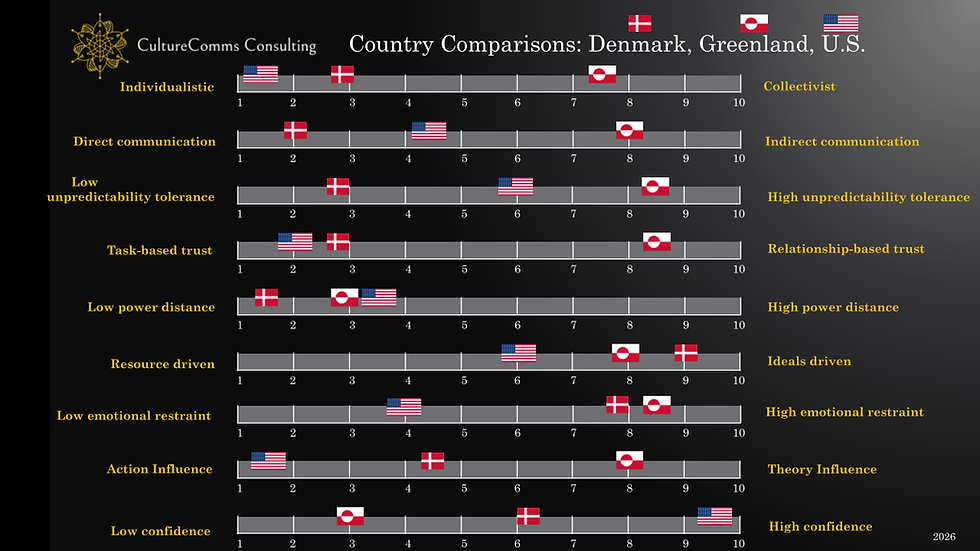Why Leaders in Global Companies Must Understand Geopolitics
- adamraelson
- Dec 11, 2024
- 3 min read
In our increasingly interconnected world, it is vital for leaders stepping into global roles to have a strong understanding of geopolitics. As businesses expand across borders, leaders find themselves working closely with people from vastly different regions — each with unique political systems, cultures, and historical contexts. Navigating this complexity effectively is essential for building trust, earning respect, and aligning global teams towards success.
My “Second Most Embarrassing” Work Story
I'm going to share with you a personal example. When I was 24, I landed my first entry-level job in communications in a shared services center. It was a regional EMEA role overseeing five countries, including Ireland. My job at that time mainly involved executing communications rather than strategizing. One day, I received a request from the UK HR team to send out an announcement to employees in "Southern Ireland." The UK HR team had already drafted the message, and I merely reviewed it for formatting and branding before hitting send to about 75 employees on the DL (distribution list).
What followed was a flood of angry emails from employees in "The Republic of Ireland." You see, given the long history of conflict between the nations on the Emerald Isle, the term "Southern Ireland" is not only incorrect but it also reignited feelings of animosity to many. By sending that email without the geopolitical context, I had unknowingly reignited animosities with a term that UK HR likely didn’t realize was problematic. It was an eye-opening experience that left a lasting impact on how I approach communication.
Lesson Learned
That incident taught me that effective communication is not just about branding, timing, or formatting. It’s about understanding the lived realities of your audience — including their geography, politics, history, and culture. When you don’t take these into account, even well-intentioned messages can go disastrously wrong, like in my Ireland experience.
Key Takeaways for Leaders
Here’s how you can avoid similar pitfalls and lead more effectively in a global context:
1. Know the Correct Names for Countries and Cities
Using outdated or incorrect names can alienate your audience. For example:
The independent country on the island of Ireland is “The Republic of Ireland” — not “Southern Ireland.”
Cities like Bombay, Calcutta, and Madras are now Mumbai, Kolkata, and Chennai.
Even 31 years after the split, people still mistakenly refer to my country, the Czech Republic, as Czechoslovakia.
And recently, in English we have moved away from referring to "Ukraine" as "The Ukraine".
2. Understand the Nuances of Terminology
Words can carry different connotations across cultures. For example:
Imagine you want to communicate to your audience in Germany. Saying “German employees” might imply employees of ethnic German heritage. Rather, use terminology like “employees in Germany”, which is more inclusive of colleagues of non-ethnic German heritage or those with other citizenships residing in Germany.
Conversely, it's the opposite in other countries. In Malaysia, “Malaysian” refers to all citizens of the country, while “Malay” specifically denotes an ethnic group or language.
3. Stay Informed Through Accessible Resources
Regularly update your knowledge of geography, culture, and geopolitics through entertaining and insightful YouTube channels. My personal favorites are:
4. Adapt Your Tone and Style
Humor, body language, and communication styles vary globally. For example, what’s persuasive in one culture might fall flat or offend in another. Study cultural preferences and tailor your communication approach to build trust and respect.
5. Think of Yourself as a Diplomat
Think of yourself as a diplomat when interacting with your teams in different countries. Whether traveling or working remotely, adopt the mindset of being a "cultural and national ambassador". It’s up to you to build meaningful connections and foster mutual respect. Sometimes, when governments fall short, it’s up to us to as individuals to build bridges, and promote peace and affection across borders. Approach every interaction with humility, curiosity, and a genuine willingness to understand and celebrate differences.

Geopolitical awareness is not just a “nice-to-have” for global leaders — it’s essential. And CultureComms can help you with this. By understanding the realities of the regions where your teams live and work, you’ll foster stronger relationships, communicate with greater respect, and avoid embarrassing missteps like my 24-year-old self experienced!
Have you ever learned a similar lesson the hard way? Share your story — or your favorite resources for staying informed — in the comments below. Let’s keep the conversation going!
Oh, and P.S.: Maybe one day I will share with you my "number one most embarrassing" work story!
#geopolitics #geography #ireland #irish #UK #unitedkingdom #workstory #embarrassing #leadership #leaders #culture #hr #hradmin #communication #communications #interculturalcommunication #lessonslearned #tips #bestpractices #easterneurope #centraleurope #scandinavia #nordic #british #lessons #learning #ambassador #diplomat #diplomacy #globalteams #globalleadership




Comments